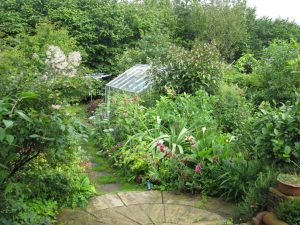Spending as much time as possible in the garden, park or allotment is one of the key ways to keep mentally healthy during this pandemic.
.
UK Research and Innovation takes a look at the latest research on the value of nature (quoted text) :
.
Ways plants promote better mental health and wellbeing
Research has shown that spending more time in nature has a beneficial impact on our mental health. In fact, research funded by the Natural Environment Research Council (NERC) and the Economic and Social Research Council (ESRC) has found that living with a regular view of a green space provides health benefits worth £300 per person per year.
The MARCH Network, one of UK Research and Innovation’s eight mental health networks, is investigating the role places such as parks and allotments have on mental health, and includes Nature Connectedness, a project at the University of Derby looking at our psychological links to nature.
The Department for Environment, Food and Rural Affairs #healthyplantshealthy minds campaign is encouraging people to share photos of their house and garden plants on Instagram and Facebook, which have been shown to help reduce stress, improve mental health and concentration.
With COVID-19 restricting the movement of people, closing gyms, entertainment and socialising spaces, spending as much time in the garden, park or allotment is looking like one of the key ways to keep mentally healthy during this pandemic. We look at the three main ways plants positively affect our mental wellbeing.
Gardening
Since lockdown began, gardens have taken on a whole new purpose – as a space for physical activity and mindfulness. One of the largest studies to date on gardens and gardening, funded by Innovate UK and National Institute for Health Research, found that people who spent time in the garden report better physical and mental health levels than those who do not. The study showed the benefits of gardening were similar to the difference in health between the wealthiest and the poorest people in the country.
…

Green neighbourhoods
Living in a greener neighbourhood has also been linked to better wellbeing, based on current data collected by Natural England’s Monitor of Engagement with the Natural Environment Survey, the world’s largest survey collecting data on people’s weekly contact with the natural world, which focused on parks and playing fields.
…
Plant nutrition
Plants, which make up 80% of our diet, are crucial for our health and wellbeing. Since the pandemic, we’ve already seen a 250% surge in seed and compost sales in the UK, with many embarking on the challenge of “grown your own” as much for the mind as for the belly.
…
Ways plants promote better mental health and wellbeing | ukri.org
.
Another paper from UK Research and Innovation looks at how we ‘value nature’:
Case study – Valuing nature | ukri.org
.